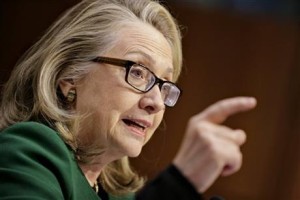
WASHINGTON (AP) — The government will review a huge cache of Hillary Rodham Clinton’s emails for possible release after revelations she conducted official business as secretary of state in the shadows of a private account. The disclosure has raised questions in the buildup to her expected presidential run about whether she adhered to the letter or spirit of accountability laws.
The matter is expected to result in the eventual release of thousands of emails from her private account, opening a new window on her tenure in high office and providing potential fodder to critics.
Officials said Thursday the review by the State Department could take months, potentially a drawn-out distraction for Clinton and an unnerving development for the many Democrats who see her as the party’s presidential nominee-in-waiting for 2016.
Secretary of State John Kerry, in Saudi Arabia, said Thursday his department “will undertake this task as rapidly as possible in order to make sure that we are dealing with the sheer volume in a responsible way.”
The review was prompted by the disclosure that Clinton, in a departure from predecessors, relied exclusively on the private account for emails about government business. The emails were sent from a private computer server using an Internet address that traces back to Clinton’s family home in Chappaqua, New York.
The department announced the review soon after Clinton addressed the matter for the first time, saying on Twitter that “I want the public to see my email. I asked State to release them.”
Her spokesman and the State Department have said she never received or transmitted classified information on her private email account, so there would appear to be no concerns about compromising national security.
“She had other ways of communicating through classified email through her assistants or her staff, with people, when she needed to use a classified setting,” said Marie Harf, speaking for the State Department. Officials have said that Clinton has turned over more than 55,000 pages of emails to the department.
Clinton’s email practices gave her significant control over access to her message archives, highly unusual in government. They also could complicate the State Department’s legal responsibilities in finding and turning over official emails in response to any investigations, lawsuits or public records requests. The department would be in the position of accepting Clinton’s assurances she was surrendering everything required that was in her control.
The matter also raises questions about whether anyone in government examined Clinton’s private email server and network before it began operating and continued to review it regularly during her tenure. Federal regulations subject the computer systems of some contractors and other organizations to federal oversight when they interact with government systems to ensure they are protected.
Under the Freedom of Information Act, the government can censor or withhold emails to protect information that would hurt national security, violate personal privacy or expose business secrets or confidential decision-making in certain areas. It wasn’t clear whether the State Department would automatically apply those provisions to its review of Clinton’s emails, or use its discretion to release even emails that might be covered under those exemptions.
Withholding emails merely because they might be embarrassing or expose government incompetence or malfeasance is not permitted under the act’s guidelines.
The State Department is already overwhelmed with nearly 11,000 pending requests for various emails under the open records law. More than 75 separate requests for Clinton material were filed with the State Department between 2009 and 2013 by media organizations and others. Associated Press requests for Clinton emails and other documents have been delayed for more than a year — and in one case, four years — without any results. The AP said this week it is considering legal action to compel responses.
On Wednesday, the House committee investigating the attacks on the U.S. diplomatic compound in Benghazi, Libya, issued subpoenas for emails from Clinton. It also instructed technology companies it did not identify to preserve any relevant documents in their possession.
The White House legal counsel’s office was not aware of Clinton’s private email account until the committee sought her communications during an earlier exchange with the department, according to a person familiar with the matter. That person spoke on condition of anonymity, citing a lack of authorization to speak on the record.
Clinton’s extensive use of private emails heightened security risks for her communications, chiefly the potential for inadvertent disclosure of sensitive information and danger from hackers, several information security experts told AP.
Under Clinton, the State Department cited security concerns about private email usage when it pressed for the 2012 resignation of Scott Gration, then ambassador to Kenya, according to a 2012 inspector general’s report.
Gration’s use of private emails was among several problems cited. The watchdog said reliance on “unauthorized information systems increases the risk for data loss, phishing and spoofing of email accounts.” Gration resigned.
___
Associated Press writers Matthew Lee in Riyadh and Brad Klapper, Nedra Pickler and Josh Lederman in Washington contributed to this report.



